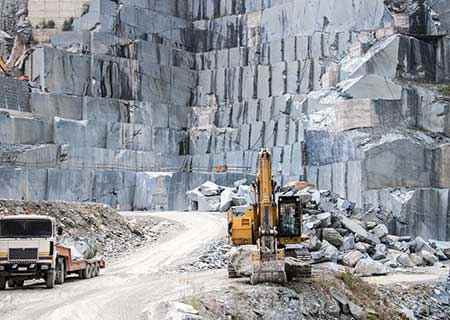
Mining and Mineral Engineering Major
A Mining and Mineral Engineering major/degree is a program that prepares individuals to apply mathematical and scientific principles to the design, development and operational evaluation of mineral extraction, processing and refining systems, including open pit and shaft mines, prospecting and site analysis equipment and instruments, environmental and safety systems, mine equipment and facilities, mineral processing and refining methods and systems, and logistics and communications systems.
Includes instruction in foundational courses such as calculus, English, chemistry, geology, mining, and physics as well as a broad spectrum of engineering courses.
What can you do with a major/degree in Mining and Mineral Engineering?
With a major/degree in Mining and Mineral Engineering, the career opportunities can be abundant. Various job titles include (but are not limited to) mine engineer, minerologist, or geological engineer.
Trade Associations and Professional Organizations in Mining and Mineral Engineering
Professional associations are groups of specialists dedicated to topics in particular fields. Professional associations provide a wealth of online resources, some of which are geared specifically towards students. These organizations typically also host conferences and events, providing great opportunities for learning and networking across your field of interest.
- American Institute of Mining, Metallurgical, and Petroleum Engineers
- Mining & Metallurgical Society of America
Publications/Magazines in Mining and Mineral Engineering
Careers in Mining and Mining Engineering
Industry Description - What Mining Companies Do
Mining and Quarrying is the search for, and extraction, and processing of naturally occurring solid minerals from the earth. Mined minerals include coal, metals such as iron, copper, or zinc, and industrial minerals such as potash, limestone, and other crushed rocks.
Companies in the Mining sector primarily engage in mining, mine site development, and beneficiating metallic minerals and nonmetallic minerals, including coal.
The term "mining" is used in the broad sense to include ore extraction, quarrying, and beneficiating (e.g., crushing, screening, washing, sizing, concentrating, and flotation), customarily done at the mine site.
Beneficiation is the process whereby the extracted material is reduced to particles which can be separated into mineral and waste, the former suitable for further processing or direct use. The operations that take place in beneficiation are primarily mechanical, such as grinding, washing, magnetic separation, centrifugal separation, and so on.
The range of preparation activities varies by mineral and the purity of any given ore deposit. While some minerals require little or no preparation, others are washed and screened, while yet others, such as gold and silver, can be transformed into bullion before leaving the mine site.
Establishments in the Mining sector include those that have complete responsibility for operating mines and quarries and those that operate mines and quarries for others on a contract or fee basis.
The Importance of the Mining Industry
Metals and other minerals are an essential source of raw materials for the building and chemical industries and are also a critical part of the production of everyday electronics and consumer products like batteries for mobile phones and electric cars.
The mining industry plays an important role in the economy. As a supplier of coal, metals, industrial minerals, sand, and gravel to businesses, manufacturers, utilities and others, the mining industry is vital to the well being of communities across the country.
Minerals are essential to nearly every aspect of our lives and our economy, including utilities, the primary metals industry, non-metallic minerals industry (glass, cement, lime, ceramics), and the construction industry.
Careers and Job Opportunities in Mining
Mining operations are often the leading employers in the communities where they operate. More than 300,000 people work directly in the mining industry.
In addition to the actual extraction process, mining offers careers in many production, management, technology and scientific roles. These include heavy equipment operators, engineers, chemists, geologists, and environmental conservationists and consultants.
The Range of Careers in Mining and Mining Engineering Include
- Environmental Compliance Coordinator
- Geological Engineer
- Geoscientist
- Mine Electrician
- Mining Engineer
- Finance Specialist and Manager
- Mine Safety Engineer
- Mine Safety Manager
- Surveyor
- Mineral and Rock Research and Science
- Mining Consultant
- Open Pit Mining Manager
- Planning Engineer (Surface and Underground)
- Process Mining Digital Engineer
- Project Engineer
- Tech Specialist Mining Systems
- Underground Mining Commissioning Specialist
- Continuous Mining Machine Operators
- Driller and Blaster
- Extraction Workers, Helpers
- Mill Maintenance & Operations Supervisor
- Mine Aggregates Production Worker
- Mine Cutting and Channeling Machine Operators
- Mine Mechanic Journeyperson
- Mine Production Technician
- Mining Roof Bolters
- Mobile Equipment Operator
- Scale Clerk
- Shovel Operator
- Shuttle Car Operator
- Surface Mining Supervisor
- Underground Mining, Machine Loading
Colleges and Universities with Mining and Mining Engineering Programs
Learn more about Majors and Programs in Biology, Biochemistry, Mathematics, Business and Management, Chemistry, Chemical Engineering, Civil Engineering, Petroleum Engineering, Mining Engineering, Metallurgical Engineering, Mechanical Engineering, Geological Engineering, Environmental Engineering, Economics.
Mining Associations - Learn More, Networking and Apprenticeship Opportunities
Mining Associations and Organizations
There are many organizations dedicated to help promote mining and mineral products. Many states that have active mining operations have local mining associations that can assist with state-specific information.
